Funding Georgia’s Future
Conservation Priorities at the State Capitol
When it comes to conservation, funding is the name of the game. The conservation of ecologically, economically, and recreationally important lands wouldn’t be possible without sustainable and reliable funding and incentives from the government. Here in Georgia, three programs critical to conservation are either nearing reauthorization or need formalized dedicated funds.
Successfully advocating for conservation funding is nothing new for the Georgia Conservancy. In the 2010s, Georgia Conservancy and a small contingent of conservation partners helped establish the Georgia Outdoor Stewardship Program (GOSP), the state’s only dedicated funding mechanism for the conservation of public lands.
GOSP, established by the 2018 Georgia Outdoor Stewardship Act and a subsequent ballot amendment, is authorized for 10 years. During the 2026 Session, the Georgia Conservancy will gather support for the program's reauthorization in 2028 and explore ways to improve the program and increase funding.
Ceylon WMA, Camden County. Photo by Alan Cressler
According to Georgia DNR, “Since the program’s establishment in 2019, GOSP has allocated over $117 million of funding to 62 conservation and outdoor recreation projects across Georgia. Grantees have committed more than $201 million to match these grant funds, for a total investment of more than $318 million.”
GOSP is responsible for the establishment and expansion of several State Wildlife Management Areas and State Parks, including Ceylon WMA, Treat Mountain WMA, Dawson Forest WMA, and FDR State Park – to name a few. Additionally, the Program has supported regionally significant recreation projects such as the Atlanta Beltline, Chattahoochee RiverLands, Jekyll Island natural areas, and the Firefly Trail.
Its reauthorization is vital to future conservation efforts in Georgia.
With the vast majority of acres in the state under private ownership, the conservation and restoration of private lands in Georgia is also extremely important. In Georgia, two significant funding mechanisms support private lands conservation: the Georgia Conservation Tax Credit and the newly established Georgia Farmland Conservation Program.
The Georgia Conservation Tax Credit (GCTC) is a vital resource for safeguarding Georgia's environmental integrity, as it provides landowners with an additional financial incentive to conserve critical acres of forest, wetlands, and working lands. However, the GCTC will sunset on December 31, 2026.
Reauthorization and improvement of this important conservation incentive will be a priority of the Georgia Conservancy and our partners in the Association of Georgia Land Trusts during the 2026 Legislative Session.
The Georgia Farmland Conservation Program (GFCP) was established during the 2023 Legislative Session through the overwhelming passage of Senate Bill 220, directly due to Georgia Conservancy advocacy. The Program offers farmland owners a financial incentive to conserve lands that are under threat of development. The establishing legislation was developed by the Georgia Conservancy, in concert with Representative Richard Dickey, Senator Russ Goodman, and the Department of Agriculture.
Having established the program, it is now necessary to create a formalized source of dedicated funding. In the FY 2024 Budget, the State initially allocated $2 million to GFCP. During the 2026 Legislative Session, the Georgia Conservancy will advocate for increased, consistent, and sustainable funding for the GFCP and additional policies that may help achieve this goal.




